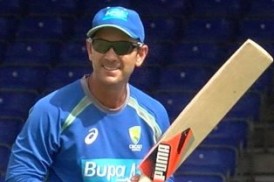I can offer compassion as a coach : Justin Langer
Ganeshbabu Venkat |
Justin Langer talks about cricket coaching, his temporary assignment, his partnership with Matthew Hayden, the successful Australian team he was with and two of his memorable Test matches during his playing days.
Right off the bat I want to start by asking what does a cricket head coach bring to the table? There is always so much hype about the modern day coaches. At the end of the day cricket is a fairly simple game of bat and ball. Please elaborate on that.
Personally I can offer compassion as these guys are not experienced, as a former international player Darren Lehman and I can offer that. We understand how hard it is to make a debut, the pressures and circumstances in this game and also understand things that are outside of bat and ball. You mentioned that it’s a simple game of bat and ball, I think that it’s a little more than that.
Human mind is complex, We are dealing with people all the time. The head coach sets the agenda and can set the path where the team wants to go and the values the team wants to stand by. It’s like leadership in any business where you have got to have leadership to set the direction and implement it. The work culture needs to be set for a business and the same applies here.
Part of the culture is behavior and that involves Setting the agenda for what the expected behavior is on and off the field. That is what a head coach, captain and support staff need to do. That is probably the easy part. The hard part is implementing the goals and that is where some one is successful or not so successful. In my case, if it’s Australian cricket or Western Australian cricket it’s to be number one in Australia or the world. It does not happen with just talent, It happens based on the direction, behavior and the values that we as a sporting team set ourselves.
Cricket coaching has become such a modern phenomenon. Batting, bowling and fielding coaches, physios, performance analysts and a whole bunch of specialists for each areas, assisting teams nowadays. How far can this go?
The whole concept of coaching in cricket is still a little immature compared to other sports around the world. However I think it’s maturing and getting in to where other sports are today. The game has become such a huge phenomenon internationally. If you go back to 1993, when I started playing there was just Bob Simpson, the coach along with one physio and that was it.
The game has evolved from those days and we have professional cricketers who want to achieve more and get better. These specialist coaches certainly help them achieve that and it’s not going to slow down. That’s how the model is going to be and we are going to have an all hands on deck approach to help the players, especially youngsters who want to develop their game and that’s certainly a positive thing going in to the future.
Should the cricket head coach take more responsibility at the micro level like a football coach by spreading his wings across administration, team selection,vetting and scouting youngsters?
I think it’s heading that way, That’s my gut feeling and it’s certainly happening at the domestic level. In cricket, there are some systems that still are traditional, especially the role of the captain and the role of the selectors. But I think sooner or later it will head towards that way where the head coach will have more of a say, or should have more of say. That’s a good thing and I’m certain it will improve the relationship between the players and the coach, especially the captain and the coach and it’s certainly a good thing that will help teams improve better as a whole.
As a stand in coach what were the goals you set yourself and what have you accomplished?
No matter what one is to get the job done and in this tri-series and we successfully did that. Secondly Darren has been in the role for three years now and it’s a nice thing to give him a break so that he can come back recharged for the SriLanka series. Not only that I can give him some observations from outside which can help him set his direction with this new and young team.
I loved working with these guys and admire them for scraping through this series. This is not an easy job since we have to put incredibly long hours and it will help me when I go back to Western Australian cricket to implement some of the things that I learned in coaching the national side.
I’m going to switch to your playing career and talk a bit about your batting partnership with Matthew Hayden. “In an earlier interview with Cricket Couch I’m quoting from the interview and the book “Matthew Hayden who had written in his book about JL and I quote, “We were united in our passion by work ethic, but diametrically opposed in other areas.” I’m asking the same question to you and want you to expand on the similarities and differences.
To start off, I was 5’6 and he was 6’5 and we were straight up opposites in that regard.(laughs). I was more of a touch player and he was more of this dominating enforcer. If you see, I hit the ball very square of the wicket and he hits it down the ground. Also he was a natural stroke maker and I was more of a grinder. Where we were similar were we trained and worked very hard and we have very similar life values and work ethic. I still boast to people that not everyone gets to work with their best mate every day.
When you go in to the battle of a Test match, You want to know you got your brother by your side. It’s like going to a school yard fight with your brother by the side. That’s how I felt playing with Matty. Probably he felt the same too and that’s probably one of the similarities. Not only Matty, That whole team with Ricky Ponting, Adam Gilchrist, Shane Warne and Glen McGrath, We obviously had a talented team but that brotherly camaraderie was what kept us glued as a unit , particularly when the pressure was on. I think those are the things he talks about. Also we both were lefties and there is always an emphasis on the right-hand left hand openers, but in our case it worked fantastically well.
You mentioned the successful Australian team of the 2000 era, that team had the attitude of defeat before a draw. Why was the emphasis so much on winning when a draw would have given you a couple of series wins? What was the thought process all about?
I thought it was just a matter of being bold. If you always have that approach, sure we could lose a couple of games, but it intimidates the opposition. You could say that we wanted to make a statement to the opposition that they had to be on top of their game if they want to beat us. The best way to win was to attack.
The only time I have seen McGrath or Warne under pressure was when the opposition had the courage to attack them and that did not happen very often. Two instances that come to mind are Brian Lara in 1999 and VVS Laxman in 2001 and you know how those two series ended and how close the games where. That was the only time they took games away by being courageous. That positive mindset and positive approach is what wins you games and in that respect sure we lost a few, but it made for a great spectacle and there was not much of a contest when we won matches.
I want to wrap it up by asking about two Test matches in your career, The 1999 Test match vs Pakistan at Hobart and the 2001 Kolkata Test vs India.
1999 Hobart Test, Probably my favorite Test match. It was favorite for a number of reasons. That was Steve Waugh’s first home series as captain, John Buchanan had taken over the coaching job and We were chasing 300 odd (327), Pakistan had a great attack with Wasim Akram, Waqar Younis, Saqlain Mushtaq,Azhar Mahmood and Shoaib Akthar. Adam Gilchrist was only playing his second Test and was such an unbelievable talent. We were 100/5 (124/5), when Gilly walked in and played one of the best Knocks I got to see from the other end. He smashed them to all parts of the park and played with such ferocity that I had to duck a few times at the non-strikers end. It was such a knock that we wore down Pakistan and eventually won the game. Of course there were a few interesting moments in that game.(laughs). More importantly, It was that game that gave us the confidence that if we could win from there we could win from anywhere and everyone had to play a role in that. That was part of the 16 Test streak dream run and we ended up winning 13 Tests after that, It’s hard enough to win two Tests leave alone 16 straight Tests. It is one of those memories and I’m glad that people still remember that Test to this date.
2001 Kolkata Test, “I still can’t believe that Test match. I still can’t believe we lost it.” (long pause) “What can I say.”(laughs). We made India follow on and there was some discussion about that but the bowlers were fresh and we did what we did. At the end of the 3rd day Tendulkar was out and we thought the game would end sometime on the 4th day. I still remember Michael Slater had gone out and brought a big box of Havana cigars to celebrate the win. Of course VVS and Dravid batted the whole of the 4th day and I still could not believe how they did it.
The thing I most remember about that match was something that happened after tea on the 4th day. During the break Steve Waugh said to the team and the bowlers “This is the plan, we are going to bowl on the off-side to Laxman setting a 7-2 field, make sure you bowl Wide out side the off stump. Steve asked McGrath and everyone “you guys understand the plan? We bowl wide and contain the runs and induce him in to making a mistake, If we get him out we are still in the game and let’s execute the plan”. The very first ball from McGrath, Laxman just blocks it and “bang” it hits the boundary before anyone could move. First ball after the break with men out on the boundary the ball hits the boundary board it just broke our hearts. That was a brutal innings wasn’t it?
In hindsight I still regret going after the bowling on the 5th day after lunch, I was the one who went after Harbhajan just to unsettle him, now that I think about it I regret it especially the way the game ended up. We were going for the 17th win and you can imagine when we had won 16 in a row you as a team and an individual are confident and the fear of failure goes out of the window. You are not expecting to lose and feel like you can take on the world and we probably did try and take on the world that day and it did not work out. Those were great memories and needless to say we never got to smoke those cigars.





Leave a comment